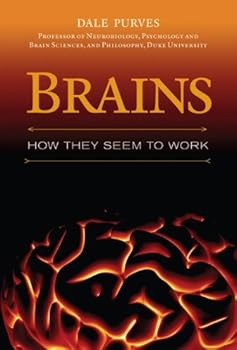

"The 'Brains' in Dale Purves’ book are both the focus of his research and the intellectual giants with whom he mixed in his remarkable career. At one level Brains is a charming autobiography; at another a vivid personal account of 50 years in the evolution of neuroscience. But it also lays down a challenge to the mainstream view that simple, sequential analysis of nerve cells and their responses can explain the apparently impossible task of seeing the world as it really is on the basis of the infinitely ambiguous retinal image. Brains is a delight--for its insights into both the scientists and the science of the brain."
--Colin Blakemore, Universities of Oxford and Warwick
"Dale Purves has been a leading figure in brain science for 40 years: He has made numerous discoveries, founded departments, and written major textbooks. In Brains, he tells the story of his scientific journey and intertwines it in an elegant and accessible way with two others: the uneven progress of the field over the past half century and the new view of brain function to which the field's shortcomings have led him. Some neuroscientists are likely to disagree with Purves' heretical theories, but none can afford to ignore them."
--Joshua R. Sanes, Harvard University
"Brains is much more than a book about brains. It is a journey that takes the reader through the modern history of neurobiology, a personal account that illuminates both what we know about brains and the mysteries that remain in understanding how brains work."
--Terrence J. Sejnowski, Howard Hughes Medical Institute, Salk Institute, and University of California at San Diego
"Dale Purves had the good fortune to be present at the birth of the new discipline of neuroscience, which condensed in the 1960s and 1970s from elements of physiology, anatomy, and neurology. The first half of the book tracks his odyssey through two of the linchpin departments of the new discipline, those at Harvard Medical School and University College London, to introduce the basic principles of neuroscience for nonspecialists. The book's second half encapsulates Purves' major contribution to the field of neuroscience, and particularly to visual neuroscience. The experimental tools developed during the past half century provide us with an excellent picture of the activity of individual neurons. At the same time, these tools seduce neuroscientists into a reductionist approach that focuses on the microscopic details of visual analysis. Perhaps owing to his training in philosophy, Purves recognized the evolutionary importance of the way that we see: The brain does not report an objective reality but instead provides its best guess at that reality on the basis of the fragmentary information at hand. The brain can be misled by unusual and contrived visual inputs--the basis of visual 'illusions'--but this scarcely represents a defect: The brain interprets patterns of light, darkness, and color on the basis of the most plausible natural stimuli, and it remains for researchers to learn how this interpretation comes about. Brains offers a guide to thinking like a neuroscientist."
--A. James Hudspeth, Rockefeller University
"This is a lucid, easy-to-read summary that is fascinating reading for anyone interested in what we know and do not know about how brains work. Purves brings together a unique expertise and priceless personal observations about several subfields of brain research and the scientists who have shaped our present understanding of it over the past eventful fifty years."
--Pasko Rakic,Yale University School of Medicine
"Dale Purves' Brains is my favorite sort of reading--an engaging and intelligent scientific autobiography full of vivid personal and historical accounts; the story not only of a life but of an intellectual pursuit. Purves has a unique voice, lively, outspoken, and very human--and his love of science comes through on every page."
--Oliver Sacks
"Brains is an engaging tour of human neuroscience from one of its most distinguished and opinionated practitioners. Dale Purves is a lively and informative guide to the field, having been at the scene of some of its great discoveries and having made many important discoveries himself."
--Steven Pinker, Harvard University, author of The Stuff of Thought
"A rare account of both the modern history of key discoveries in brain research by someone who was there and responsible for many of them and also a heartfelt account of the joy of it all. Dale Purves has given us an inside view of a life in science and explains with clarity what it all means."
--Michael S. Gazzaniga, University of California, Santa Barbara, author of Human: The Science Behind What Makes Us Unique
"Brains is a delightful book that weaves together Dale Purves' personal neuroscience history with the history and current status of the field. I enjoyed it start to finish."
--Joseph LeDoux, New York University, author of The Emotional Brain and Synaptic Self
"This book is many things. It's the memoir of an immensely likeable human (who I only previously knew as a distant giant in my field). It's people with strong personalities that give lie to the notion that science is an affectless process. But most of all, it is a clear, accessible, affectionate biography of neuroscience. This is a terrific book."
--Robert M. Sapolsky, Stanford University, author of Why Zebras Don’t Get Ulcers
"Both highly entertaining and educational. A masterpiece."
--Bert Sakmann, Max Planck Institute for Medical Research, winner of the Nobel Prize in Physiology or Medicine
Hiç yorum yok:
Yorum Gönder